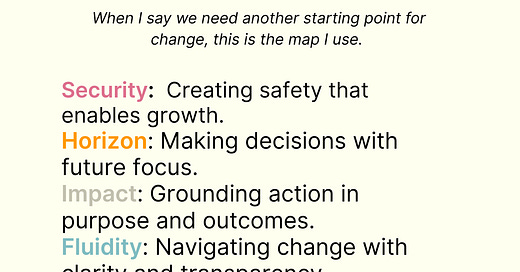The problem isn’t skills. It’s access.
There’s no shortage of frameworks telling us what’s needed for change:
Adaptability. Innovation. Strategic thinking. Empathy. Resilience.
The research is clear. The models are complex.
But the question I keep asking is:
What happens when people can’t access those capacities in real time?
It’s not because they don’t care.
It’s not because they don’t understand.
Often it’s because their systems are overwhelmed.
76% of people in decision-making roles say they don’t have the energy to be effective.
That’s not about work ethic.
It’s about regulation.
It’s about nervous systems operating in survival mode.
Under chronic pressure, even the best strategies fall apart.
Creativity narrows. Collaboration breaks down.
We may know what matters, but we can’t reach it.
Because biologically, our systems are built to survive not to strategize.
When the nervous system is in fight, flight, or freeze, it reroutes energy away from the parts of the brain responsible for reflection, perspective-taking, and decision-making.
It’s not a failure of leadership. It’s a physiological response.
This is where change efforts often fail.
They focus on competencies before building capacity.
They jump to action before there’s clarity.
They expect alignment before there’s capacity.
The SHIFT framework offers another way in.
It’s a human-centered system for change. It starts with internal regulation, and extending into how we work, relate, and evolve together.
The five domains of SHIFT:
Security: Creating safety—within and between us.
Horizon: Making decisions with future focus.
Impact: Grounding action in purpose and outcomes.
Fluidity: Navigating change with clarity and transparency.
Ties: Strengthening connection and belonging.
Most of us have one domain that comes naturally.
Some of us hold steady in chaos. Some of us build connection instinctively.
But under stress, even our strengths can distort or disappear.
So we begin with regulation.
Not as the whole solution, but as the foundation.
Because meaningful change doesn’t start with big ideas.
It starts with access.
To clarity. To presence. To possibility.
If your system for change doesn’t start with nervous system capacity, it’s already on shaky ground.
Start smaller. Start closer. Start with what’s possible under pressure.
Make the shift.




